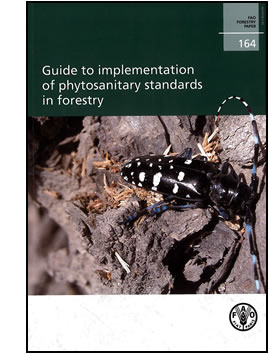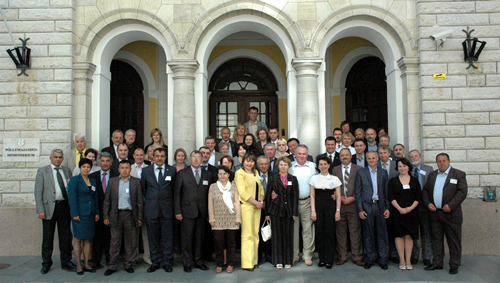
EPPO/FAO Workshop on the FAO ‘Guide to implementation of phytosanitary standards in forestry’ for Russian-speaking experts
Tallinn, EE, 2011-05-30/06-03
The Workshop in Tallinn was the first regional workshop on implementation of the FAO “Guide to implementation of phytosanitary standards in forestry”. It will be followed by other regional workshops and will serve an example for them. It was explained to participants that the main aim of the FAO “Guide to implementation of phytosanitary standards in forestry” (developed by the Guide Core Group and reviewed by experts from more than 100 countries) was to establish/improve cooperation between NPPOs and forestry agencies responsible for forest protection.
standards in forestry”. It will be followed by other regional workshops and will serve an example for them. It was explained to participants that the main aim of the FAO “Guide to implementation of phytosanitary standards in forestry” (developed by the Guide Core Group and reviewed by experts from more than 100 countries) was to establish/improve cooperation between NPPOs and forestry agencies responsible for forest protection.
In most countries, NPPOs are under agricultural agencies and as such it is not always clear that forest trees also fall within their responsibilities of plants that the NPPO should protect against the introduction and spread of regulated pests (quarantine and non-quarantine).
Forest agencies normally deal with forest pests widely distributed on the territories of their countries (non-regulated pests) and do not always realise the threat presented by introduction and spread of regulated pests. Therefore the collaboration between two services in most countries is poor or inexistant. Participants of the Workshop have been strongly encouraged to use the “Guide to implementation of phytosanitary standards in forestry” for practical improvement of this situation.
The Workshop was held in Russian language, 35 presentations were made, followed by questions and discussions. The Workshop was attended by 49 participants from 16 countries, EPPO Secretariat and FAO. Participants’ background included management, inspection research and regulation in the field of plant quarantine and forest protection.

Participants have been informed about the world structure of plant protection: on IPPC, RPPOs (including EPPO), FAO activities in plant protection in Eastern Europe as well as on the role and obligations NPPOs including obligations for forest protection. They were also informed about principles and practices of forest protection including growing healthy forest plants for planting, forest operations, preventing spread of forest pests, as well as about ISPMs. Following the FAO Guide, presentations on implementation of ISPMs were specifically focused on PRA, pest management, pest surveillance, regulation of wood packaging material, pest reporting, establishment and recognition of pest-free areas and sites, phytosanitary inspection, phytosanitary certification, notification of non-compliance and phytosanitary import regulatory systems.
Each participating country (Armenia, Azerbaijan, Belarus, Estonia, Georgia, Latvia, Lithuania, Kazakhstan, Kyrgyzstan, Moldova, Russia, Tajikistan, Turkey, Ukraine and Uzbekistan) gave a presentation on their national situation with implementation of phytosanitary standards in forestry and the status of cooperation between the NPPO and forest agencies. It appeared that the situations were quite different from one country to another from very good cooperation between the NPPO and forest agencies to complete lack of awareness of the other service work. Ms S. Sathyapala (NZ) who will organize the next Guide Workshop for the Pacific region presented the current situation in this region.
Participants of the workshop were very active and asked many questions to speakers. All participants (both from NPPOs and forest agencies) recognized that the Workshop was very informative and useful for establishing/improving cooperation between NPPOs and forest agencies and for better implementation of ISPMs and regional phytosanitary standards. In addition, the following issues were raised by participants:
- recognition of existing dissociation (varying from country to country) between NPPOs and forest agencies,
- strong need of regular national workshops for forest experts responsible for forest protection with participation of NPPO’s experts responsible for forest pests,
- the need of national joint forestry/NPPO meeting at the end of each year to assess the cooperation between NPPOs and forest agencies during the year and developing procedures to improve this cooperation in future,
- necessity of developing an amendment to ISPM No 7 on responsibilities of phytosanitary inspectors,
- necessity for both NPPOs and forest agencies to develop collaboration with municipalities responsible for protection of city plantations,
- the need for similar EPPO workshops with other agencies (e.g. customs).
The questionnaire on the awareness of two services (plant quarantine and forest protection) about each other and their collaboration prepared by the Guide Core Group was spread to participants at the beginning and at the end of the Workshop. The comparison and analysis was presented at the end of the Workshop and showed the clear improvement of participants’ awareness and understanding of the needs of cooperation between two services for implementation of phytosanitary standards in forestry.
In general, participants recognised that the Workshop was an excellent basis for development of cooperation between NPPOs and forest agencies in the region, it provided useful contact points to colleagues in both services, and it showed weaknesses to be corrected. Participants greatly appreciated the FAO “Guide to implementation of phytosanitary standards in forestry” and believed that this Guide will be widely used in countries of the region to achieve the main aim: growing and maintaining healthy forests. Participants thanked EPPO, FAO and the Estonian organisers for the Workshop.
